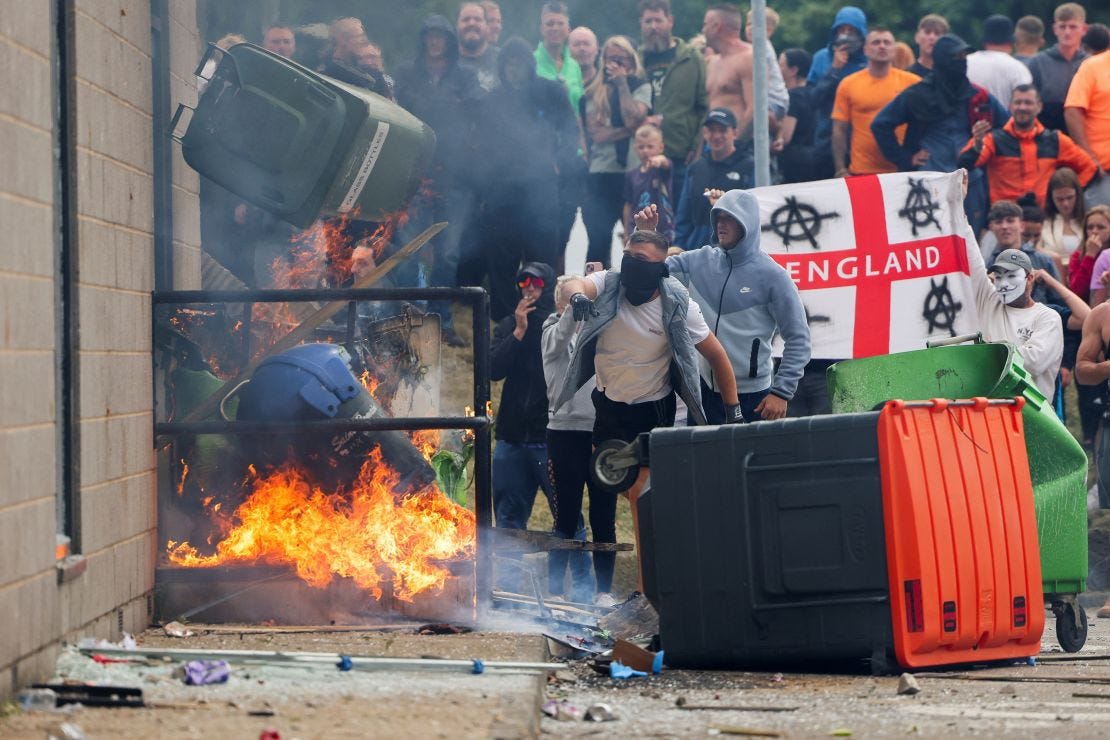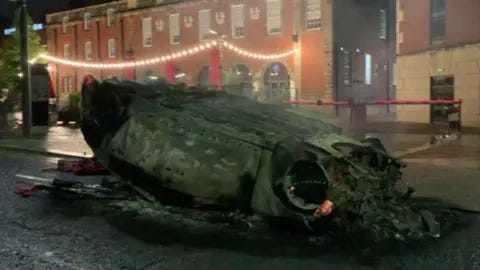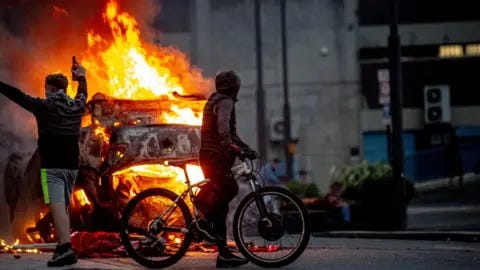Liverpool Stabbing Tragedy: The Impact of Social Media Disinformation and Anti-Immigrant Rioting in the UK
Stabbing Incident Near Liverpool: A Comprehensive Account and the Aftermath.

The Incident
On July 29, 2024, a tragic mass stabbing occurred at a dance studio in Southport, a coastal town approximately 20 miles north of Liverpool, UK. The attack took place during a Taylor Swift-themed yoga and dance workshop for children aged 6-11 at the Hart Space, a community studio in the Meols Cop area of Southport.
Victims
The senseless violence resulted in the deaths of three children:
Bebe King, aged 6
Elsie Dot Stancombe, aged 7
Alice Dasilva Aguiar, aged 9, who succumbed to her injuries in hospital the following day
In total, 11 children and 2 adults were injured. Of these, 5 children and both adults were initially reported to be in critical condition.
The Suspect
The suspect, identified as Axel Rudakubana, a 17-year-old male, was arrested at the scene. Rudakubana faced charges of three counts of murder, ten counts of attempted murder, and possession of a bladed article. Contrary to initial rumours and misinformation, Rudakubana was not an illegal immigrant. He was born in Cardiff, Wales, to Rwandan parents and was raised in a Christian household. At the time of the incident, he had been living in Banks, Lancashire, about 5 miles from Southport.
The Riots
The stabbing incident triggered widespread riots across England and Northern Ireland, primarily fuelled by far-right groups and misinformation on social media. The riots began on July 30 in Southport, where a crowd, some believed to be supporters of the English Defence League, gathered outside Southport Mosque. They wrongly believed the suspect was a Muslim immigrant due to online misinformation.
The unrest quickly spread to other parts of the UK, including London, Manchester, Hartlepool, Aldershot, Sunderland, and Rotherham. Rioters clashed with police, set vehicles on fire, and caused significant property damage.
Police Response and Casualties in the Riots
The National Police Chiefs' Council mobilised nearly 4,000 extra officers to prevent further violence. Various police forces, including Merseyside Police, Greater Manchester Police, and others, were involved in tackling the riots. While no deaths were reported in the riots, at least 59 police officers and 3 police dogs were injured. Over 190 people were arrested across various locations.
Misinformation and the Targeting of the Muslim Community
In the wake of the Southport stabbing incident, the Muslim community faced unwarranted targeting despite the suspect having no ties to Islam. False rumors spread on social media claimed the suspect was a Muslim immigrant named "Ali al-Shakati," a narrative later debunked by the police. This misinformation fueled a wave of Islamophobic rhetoric and violence.
Attacks on Mosques and Anti-Muslim Rhetoric
Rioters, driven by misinformation, targeted local mosques in Southport and Hartlepool. In Southport, a mob of up to 300 people, including members of the far-right English Defence League, attacked a mosque, hurling bricks and causing significant damage. Protesters shouted anti-Muslim slogans, such as "We want our country back," while far-right influencers and politicians amplified anti-Muslim narratives on social media platforms. This led to an escalation of Islamophobic violence, prompting the Muslim Council of Britain to call on the government to address the growing issue of Islamophobia.
Community Response and Heightened Anxiety
Despite the violence, local residents in Southport displayed solidarity with the Muslim community by coming together to clean up and repair the damaged mosque. This act of support contrasted sharply with the heightened anxiety felt by Muslim communities, who reported escalating Islamophobia in the wake of the incident. Various organizations, including the Liverpool Region Mosque Network and the Muslim Council of Britain, condemned the violence and the exploitation of the tragedy to incite hatred against Muslims. It is important to note that the targeting of the Muslim community was based on false information, and the actual suspect was a 17-year-old born in Cardiff, Wales, with no connection to the Muslim community or recent immigration.
Political Statements
Prime Minister Keir Starmer's Response
Prime Minister Keir Starmer condemned the violence, describing it as "far-right thuggery." He met with police officials to offer the government's "full support" for law enforcement. Starmer emphasised that while the right to peaceful assembly must be preserved, those who incite hatred and perpetrate violent acts would "encounter the full weight of the law."
Former Prime Minister Rishi Sunak's Statement
Former Prime Minister Rishi Sunak expressed his shock and sympathy via a tweet on July 29, 2024: "Shocked by the horrendous attack in Southport today. My thoughts and prayers are with the family and friends of the victims."
Keir Starmer's Follow-Up Statements
Initial response (July 29, 2024): "Horrendous and deeply shocking news emerging from Southport. My thoughts are with all those affected by this terrible attack. I am being kept updated as the situation develops."
Follow-up statement (July 30, 2024): "The people of Southport are reeling after the horror inflicted on them yesterday. They deserve our support and our respect."
Condemnation of far-right violence (August 4, 2024): Starmer strongly condemned an attack on a hotel housing asylum seekers, describing it as "far-right thuggery." He stated that "there is no justification" for such violence and pledged to provide police across the UK with more resources to address what he termed "a breakdown in law and order on our streets."
The Southport Tragedy and Its Aftermath
The Immediate Impact and Community Response
The tragic events in Southport and the subsequent riots highlight the destructive power of misinformation and the urgent need for a measured, unified response to such crises. While grieving the loss of innocent lives, the community must focus on healing and rebuilding trust. Both Prime Minister Keir Starmer and former Prime Minister Rishi Sunak's statements underscore the importance of support, respect, and adherence to the rule of law.
The Role of Misinformation and Deep-Rooted Tensions
While the anti-immigrant and anti-Muslim riots are entirely condemnable, it is essential to recognise that the blame cannot be placed solely on social media disinformation. These events are symptomatic of deeper societal tensions in Britain, a nation that prides itself on being multicultural and multiracial. Addressing these issues requires a comprehensive approach that goes beyond treating them as mere law and order problems. While arsonists, rioters, and hooligans must be dealt with firmly, it is equally important to address the underlying causes.
Economic Distress and Social Unrest
The looting of shops by manifestly white individuals also highlights the deep economic distress plaguing post-Brexit UK under the conservative rule, which has fortunately ended. This economic hardship has exacerbated social tensions and unrest.
The Challenge Ahead for Prime Minister Keir Starmer
It is crucial for all sections of society to come together, reject hatred, and work towards a more inclusive and understanding community. This presents a significant challenge for the new Labour Prime Minister, Keir Starmer. Rebuilding trust, fostering unity, and addressing the root causes of these tensions will require dedicated and sustained efforts from the government and the broader society.





